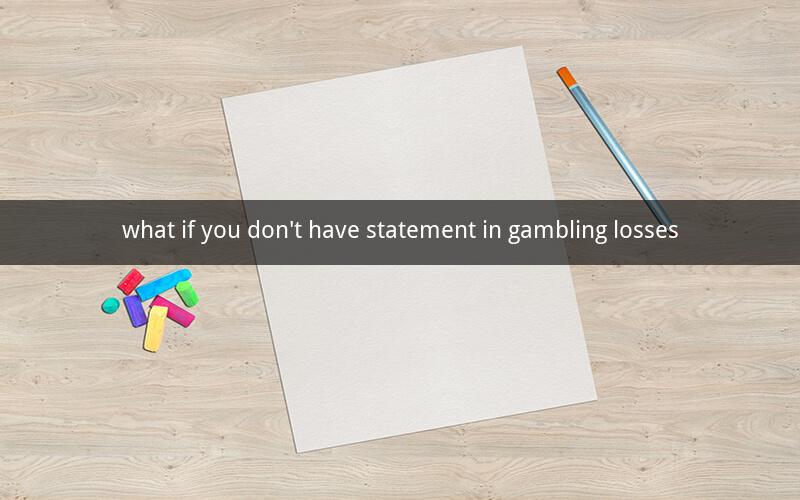
Table of Contents
1. Understanding the Concept of a Gambling Loss Statement
2. The Importance of a Gambling Loss Statement
3. Consequences of Not Having a Gambling Loss Statement
4. Alternatives to a Gambling Loss Statement
5. Documentation to Support Gambling Losses
6. Tax Implications Without a Gambling Loss Statement
7. Reporting Gambling Losses to the IRS
8. Keeping Records of Gambling Activities
9. Legal Considerations and Documentation
10. Seeking Professional Advice
---
1. Understanding the Concept of a Gambling Loss Statement
A gambling loss statement is a document that records the amount of money or value of goods or services lost while engaging in gambling activities. It is typically provided by casinos, racetracks, or other gambling establishments. This statement is crucial for tax purposes, as it allows individuals to deduct their gambling losses from their taxable income, up to the amount of their gambling winnings.
2. The Importance of a Gambling Loss Statement
The primary importance of a gambling loss statement lies in its ability to substantiate deductions for gambling losses. Without this document, individuals may struggle to prove the extent of their losses, which can result in denied deductions or audits.
3. Consequences of Not Having a Gambling Loss Statement
Not having a gambling loss statement can lead to several negative consequences:
- Denied Deductions: Without proper documentation, the IRS may not recognize your gambling losses as valid deductions.
- Audits: The IRS may audit your tax return if they suspect discrepancies between reported winnings and losses.
- Higher Tax Liability: Without the ability to deduct gambling losses, your taxable income may be higher, leading to a larger tax bill.
4. Alternatives to a Gambling Loss Statement
If you do not have a gambling loss statement, there are alternative methods to document your losses:
- Bank Statements: Review your bank statements to identify deposits and withdrawals related to gambling activities.
- Credit Card Statements: Similar to bank statements, credit card statements can provide a record of gambling-related transactions.
- Cashier's Checks or Receipts: If you paid in cash, cashier's checks or receipts can serve as proof of the amount wagered and lost.
5. Documentation to Support Gambling Losses
To support your gambling losses, ensure you have the following documentation:
- Proof of Deposits: Statements showing the amount of money or value of goods or services deposited into a gambling account.
- Proof of Withdrawals: Statements showing the amount of money or value of goods or services withdrawn from a gambling account.
- Cashier's Checks or Receipts: Documentation of cash transactions, including the date, location, and amount of the transaction.
6. Tax Implications Without a Gambling Loss Statement
Without a gambling loss statement, you may not be able to deduct your gambling losses. This can result in a higher taxable income and a larger tax bill. However, if you can provide other forms of documentation to substantiate your losses, you may still be eligible for a deduction.
7. Reporting Gambling Losses to the IRS
When reporting gambling losses to the IRS, follow these steps:
- Itemize Your Deductions: Use Schedule A (Form 1040) to report your gambling losses.
- Include All Relevant Information: Provide details about the nature of your gambling activities, the amount of money or value of goods or services lost, and the dates of the transactions.
- Keep Records: Maintain all documentation supporting your gambling losses for at least three years from the date you file your tax return.
8. Keeping Records of Gambling Activities
To ensure you have the necessary documentation for tax purposes, keep the following records:
- Bank and Credit Card Statements: Keep copies of your bank and credit card statements for at least three years.
- Cashier's Checks or Receipts: Store cashier's checks or receipts in a safe place.
- Winning Tickets or Wagers: Keep any winning tickets or wagers for verification purposes.
9. Legal Considerations and Documentation
It is important to understand the legal requirements for documenting gambling losses. In some cases, you may need to provide additional documentation to substantiate your losses, such as a police report or a statement from a gambling establishment.
10. Seeking Professional Advice
If you are unsure about how to document your gambling losses or report them to the IRS, seek the advice of a tax professional. They can help you navigate the complexities of gambling tax laws and ensure that you are in compliance with IRS regulations.
---
Questions and Answers
1. Q: Can I deduct gambling losses that exceed my winnings?
A: Yes, you can deduct gambling losses up to the amount of your gambling winnings.
2. Q: Do I need a gambling loss statement from a professional gambling establishment?
A: While a gambling loss statement from a professional gambling establishment is ideal, you can use alternative documentation to substantiate your losses.
3. Q: Can I deduct gambling losses from my business income?
A: No, gambling losses are only deductible as personal expenses, not as business expenses.
4. Q: How long do I need to keep records of my gambling activities?
A: You should keep records of your gambling activities for at least three years from the date you file your tax return.
5. Q: Can I deduct gambling losses if I don't have any winnings?
A: No, you can only deduct gambling losses to the extent of your gambling winnings.
6. Q: Can I deduct gambling losses from my unemployment benefits?
A: No, gambling losses are not deductible from unemployment benefits.
7. Q: Can I deduct gambling losses from my Social Security benefits?
A: No, gambling losses are not deductible from Social Security benefits.
8. Q: Can I deduct gambling losses from my retirement account distributions?
A: No, gambling losses are not deductible from retirement account distributions.
9. Q: Can I deduct gambling losses from my rental income?
A: No, gambling losses are not deductible from rental income.
10. Q: Can I deduct gambling losses from my alimony payments?
A: No, gambling losses are not deductible from alimony payments.